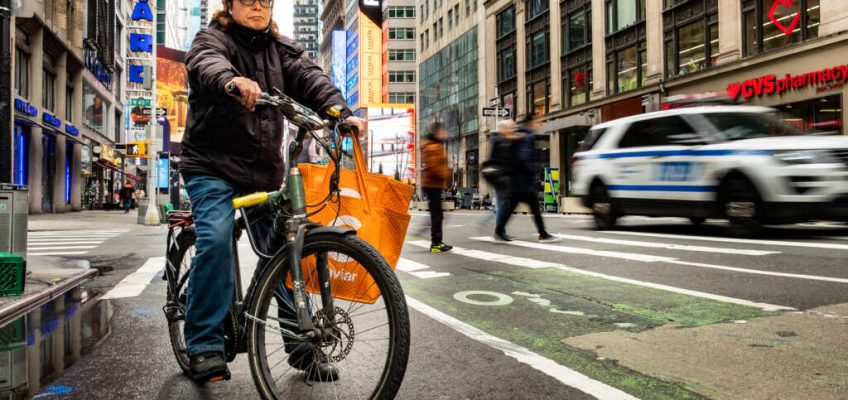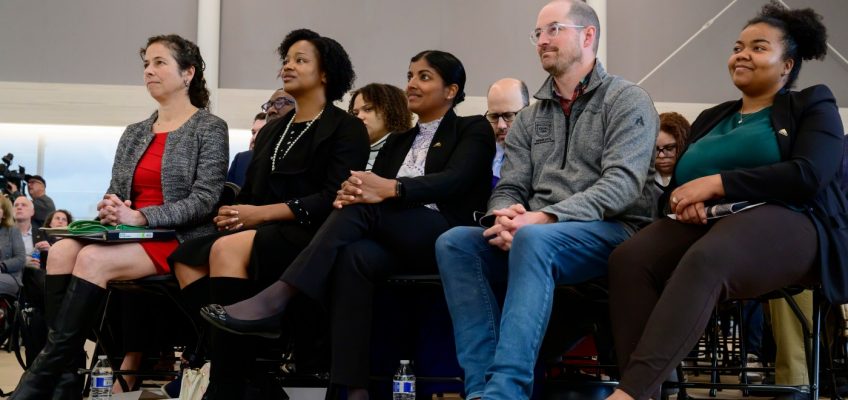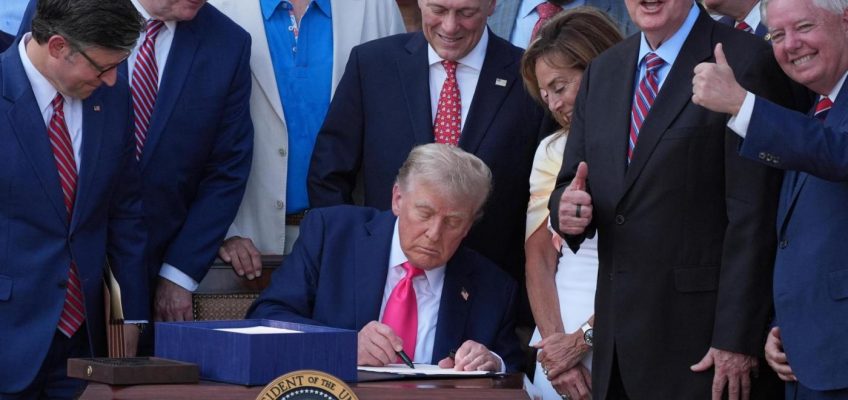The new package of bills applies to all contracted delivery workers, including those who deliver food, groceries, and other goods, and addresses pay, transparency, and safety standards.
A app-based delivery worker on the streets of Manhattan in 2020. (Photo by Adi Talwar)
In a victory led by grassroots organizers, the City Council voted this week to expand workplace protections for delivery workers.
The new package of bills applies to all contracted delivery workers, including those who deliver food, groceries, and other goods, and addresses pay, transparency, and safety standards.
Several organizations backing food and delivery workers, as well as politicians, gathered on the stairs of City Hall Monday to celebrate the legislation, which officials say builds on a law passed in 2021 that mandated the Department of Consumer and Worker Protection (DCWP) study working conditions and pay for deliveristas to establish a minimum wage. The initial $17.96 rate went into effect in December 2023, along with other safety measures established by the study.
“In 2021, we were able to promote the first legislative package. Six laws, in favor of the delivery workers. And we managed to pass that package of laws, but they had loopholes in the law, where the platforms took advantage and, unfortunately, used them against the workers, removing the tipping option and using various methods of payment,” said Gustavo Ajche, co-founder of Los Deliveristas Unidos, which represents delivery workers.
“Thanks to the Municipal Council, today we have managed to change that,” he said.
Protections and minimum wage pay expanded
Two new bills—Intro. 1133-A, sponsored by Councilmember Jennifer Gutiérrez and Intro. 1135-A by Councilmember Sandy Nurse—close loopholes that excluded several app delivery workers from the minimum wage pay law that went into effect in 2023.
Intro. 1133-A requires DCWP to establish a minimum pay rate for all contracted delivery workers. It also expands other protections, like access to insulated delivery bags, fire safety materials, and bathrooms.
Intro. 1135-A requires third-party grocery delivery services like Instacart to pay their workers at least the minimum pay rate established by the DCWP.
“In 2021, the Council made history by setting a minimum pay rate for food delivery workers. That was a very big deal, and it led to about a billion dollars in increased wages for food delivery workers, but unfortunately, grocery delivery workers were left out of that,” said Councilmember Sandy Nurse. “Intro. 1135 is correcting them. We are going to create a minimum pay wage for grocery delivery workers, and it’s the right thing.”
Deliveristas rallying on the steps of City Hall on Monday. (Gerardo Romo / NYC Council Media Unit.)
Tipping and pay transparency
Two bills sponsored by Councilmember Sean Abreu address tipping on delivery apps.
Intro. 738-A requires third-party delivery services to prompt customers with the option to tip “before or at the same time an order is placed.” This comes in response to apps no longer including tips at checkout after deliveristas won the right to a minimum wage in 2023.
“When the minimum wage went into effect for deliveristas, the apps retaliated by removing the tipping option at checkout,” Abreu said. “Just because you’re getting minimum wage, it’s only minimum wage for active time work from the moment you pick up the delivery to the moment you drop it off, but you don’t get minimum wage for waiting for that call.”
Intro. 737-A requires apps to suggest a tip option of at least 10 percent of the purchase price on both food and grocery orders. “Let me be clear, it is a recommendation, but we do know that when those recommendations are presented to consumers, they’re very likely to pick them,” said Abreu.
Also included is Intro. 859-A, which requires “delivery services to pay their contracted delivery workers no later than [seven] calendar days after the end of a pay period.”
Apps are also required to provide workers with an itemized written statement that outlines their compensation, no later than seven days after the end of the pay period. The records have to be kept by delivery services apps for at least three years, and provided to employees upon request.
Opponents of these bills say they will negatively impact small businesses by driving customers away.
Last June, DoorDash testified against Intros 737, 738, and 859, saying enforcement of minimum wage for delivery workers increased their operating costs, increasing consumer fees as a result.
Doordash Marketplace, the platform customers use to place orders, saw an estimated 850,000 fewer orders, resulting in “approximately $17,000,000 in lost revenue for restaurants and other local merchants,” the company testified.
To balance this out, Doordash moved the tipping option to after check-out, claiming it is “very accessible and available during multiple points in the delivery process,” and up to 30 days after purchase.
Workers are still calling for legal protection against deactivations—periods during which a worker’s account is blocked and they’re prohibited from completing deliveries.(Photo by Victoria Moran Garcia)
Several organizations and delivery worker rights advocates were in attendance at Monday’s celebratory rally, including Afrikana, a Harlem-based community group that works with newly arrived immigrants, many of whom find jobs in the delivery sector.
The organization said these bills are “a step toward justice for communities who are too often invisible in the workforce. We’re talking about one of the backbones of the city, our deliveristas.”
“We believe every worker, especially migrants, deliveristas and other people in the delivery sector, should be protected, should be respected and paid fairly,” said Executive Director Adama Bah in a written statement read by Macky Diallo, director of operations at Afrikana.
While the group of deliveristas and organizers celebrated the new bills, they say more is needed. In particular, they’re calling for legal protection against deactivations—periods during which a worker’s account is blocked and they’re prohibited from completing deliveries.
“These companies say the minimum wage will cost us our jobs. But the truth is, they use lockouts and deactivations to avoid paying us what they owe us,” said Antonio Solis, a leader of Los Deliveristas Unidos and a DoorDash delivery worker. “They force us to meet impossible delivery times, bundle multiple orders, and punish us if we can’t complete them. They put our safety and risk, forcing us to choose between living wages, driving carefully, and losing our jobs.”
“That’s why our fight isn’t over,” Solis added. “We need more protections against unjust deactivations. And laws so we can defend ourselves against these companies’ pressure and fear tactics.”
To reach the reporter behind this story, contact Victoriam@citylimits.org. To reach the editor, contact Jeanmarie@citylimits.org
Want to republish this story? Find City Limits’ reprint policy here.
The post City Laws Look to Close Workplace Protection ‘Loopholes’ for App-Based Delivery Workers appeared first on City Limits.




